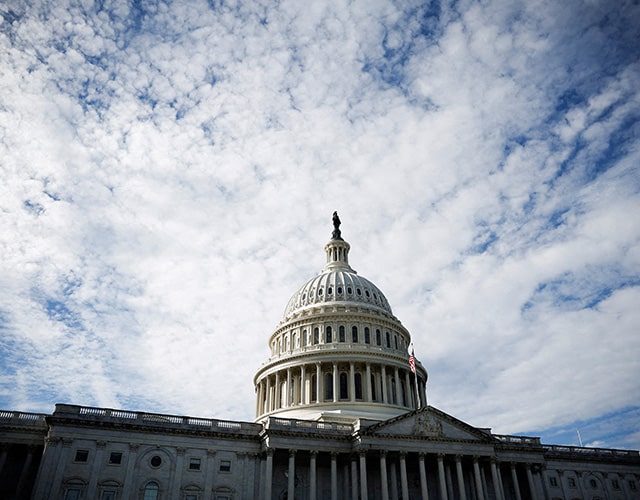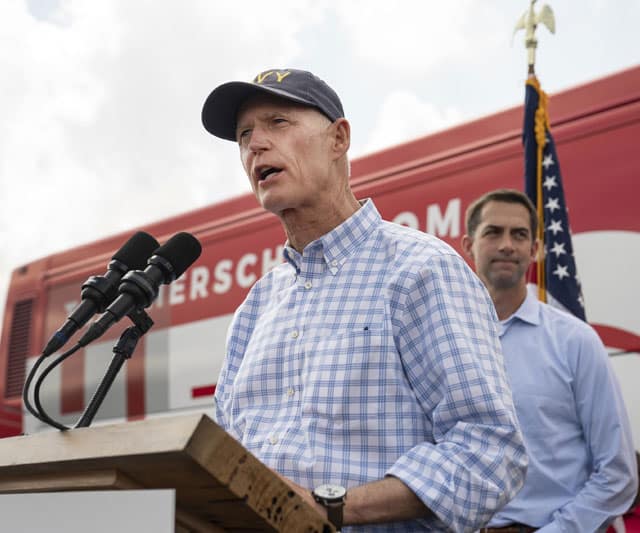Republicans in the U.S. Congress are advancing a sweeping budget package that would fulfill President Donald Trump’s calls to cut taxes and reduce spending, though details still need to be resolved.
Here are major elements of the package, along with the impact on the budget over the next 10 years, as estimated by the Joint Committee on Taxation and the Congressional Budget Office. Smaller elements of each section are not included in the list.
The tax bill portion of the package was approve hours ago by the House Ways and Means Committee in a party-line vote.
Taxes
• Makes permanent the lower income tax rates in Trump’s 2017 Tax Cuts and Jobs Act that are currently due to expire at the end of 2025. (Cost: $2.2 trillion)
• Extend the standard deduction and boost it by an additional $1,000 to $1,500 until 2029. (Cost: $1.3 trillion)
• Extends the increased alternative minimum tax exemption. (Cost: $1.4 trillion)
• Expands the Child Tax Credit to $2,500 from $1,000 until 2029, and keeps it at $2,000 after that, indexed to inflation. (Cost: $797 billion)
• Raises the estate tax exemption from $14 million to $15 million. (Cost: $212 billion)
• Extends and increases tax break for owners of “pass through” businesses, such as sole proprietorships and LLCs (Cost: $809 billion)
• Extends tax breaks for multinational corporations (Cost: $174 billion)
• Extends other business tax breaks in 2017 TCJA (Cost: $99 billion)
• Exempts taxes on some tipped income until 2029. (Cost: $40 billion)
• Exempts taxes on overtime pay until 2029. (Cost: $124 billion)
• Exempts taxes on interest payments on loans for domestic autos until 2029. (Cost: $58 billion)
• Exempts up to $5,000 for contributions to scholarship funds for private schools. (Cost: $20.4 billion)
• Creates new $4,000 deduction for seniors. (Cost: $72 billion)
• Allows parents to contribute up to $5,000 tax-free each year to “MAGA Accounts” for their children, to be used for school and other costs when they reach adulthood. (Cost: $17.2 billion)
• Extends 2017 TCJA elimination of personal exemption deduction. (Savings: $1.9 trillion)
• Allows taxpayers to deduct up to $30,000 for state and local tax payments, up from $10,000 now. (Additional revenue relative to pre-2017 tax code: $916 billion)
• Raises taxes on the biggest private university endowments from 1.4% to 21%. (New revenue: $22.6 billion)
• Ends tax breaks for electric vehicles, clean electricity, green energy. (Savings: $916 billion)
TOTAL COST OF TAX CUTS: $5.6 TRILLION
What’s Not Included
Trump’s suggestion to raise the top income tax rate on the highest-earning Americans.
Trump’s suggestion to end the “carried interest” tax break for income earned by private equity, venture capital and hedge fund managers.
Medicaid
Requires able-bodied adults who have no dependents to work, volunteer or be in school at least 80 hours a month.
Bolsters verification efforts that check whether participants and healthcare providers are eligible for Medicaid. Blocks regulations that make it easier to enroll.
Excludes non-citizens from the program and penalizes states that use their own funds to provide coverage to illegal immigrants.
Blocks regulations that required minimum staffing levels at nursing homes and other long-term care facilities.
Prohibits funding for gender transition therapies for minors.
Prohibits payments to large providers like Planned Parenthood that specialize in birth control, abortion and other reproductive health services.
Limits state taxes on providers that are used to raise the federal government’s contribution.
TOTAL SAVINGS: $715 billion. Enrollment would drop by at least 7.7 million people from its current level of 71 million people.
Energy, Environment and Communications
Cancels funding for green-energy grant programs in the 2022 Inflation Reduction Act, including vehicle manufacturing, home efficiency upgrades, electricity transmission, wind power.
Creates incentives for pipelines, natural gas exports and exploration.
Repeals grant programs for purchasing electric heavy-duty vehicles.
Repeals grants to reduce air pollution, greenhouse gas emissions.
Repeals fuel-efficiency standards for automobiles and pickup trucks.
Makes more electromagnetic spectrum bands for communication available for auction.
Prohibits states from regulating artificial intelligence.
TOTAL SAVINGS: $197 billion
Homeland Security
Border wall construction (Cost: $46.5 billion)
Increase staffing at U.S. Customs and Border Protection from 46,400 to 55,000 (Cost: $6.2 billion)
Surveillance towers, drones and other border-security equipment (Cost: $6.3 billion)
Increase law enforcement protection of the president (Cost: $300 million)
TOTAL COST: $67 billion
Miitary
Increase spending on shipbuilding (Cost: $32 billion)
Air and missile defense (Cost: $24 billion)
Munitions ($19.5 billion)
Nuclear weapons ($12.6 billion)
Border security ($5 billion)
TOTAL COST: $144 billion
Food Assistance
Increased work requirements for some of the 41 million participants in the SNAP food aid program
Shift some costs from federal government to states starting in 2028
SAVINGS: $230 billion
This article was provided by Reuters.







